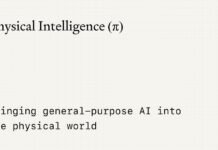Did you know almost 85% of companies see AI as key, but only 10% use it fully? This shows how AI is changing and makes us wonder: Can we make our own AI? Now, you can build AI models without being a tech expert, thanks to easy tools and resources. AI can do a lot, like find fraud in finance or spot cancer in medicine.
Platforms like Chatbase even offer free plans for making your own AI chatbot. This shows it’s easy and affordable for anyone to start with AI development12. As it gets easier, more people can make their own AI assistant.
Key Takeaways
- 85% of organizations prioritize AI, yet only 10% fully leverage it.
- Building AI models is possible with minimal programming expertise.
- Platforms like Chatbase and DocsBotAI provide affordable options for AI chatbot development.
- AI applications are prevalent across various sectors, including fintech and healthcare.
- Gathering and preparing quality data is essential for effective AI model building.
Understanding Artificial Intelligence and its Models

Artificial Intelligence (AI) includes many models that analyze data and predict outcomes. An AI model is a computer program that uses algorithms to understand data and find insights. Today, most AI is Artificial Narrow Intelligence (ANI), or “weak AI,” which does specific tasks without understanding the big picture3.
On the other hand, Artificial General Intelligence (AGI) aims to be as smart as humans, doing many tasks well3. As AI evolves, it changes industries by using machine learning and data analysis.
What is an AI Model?
AI models are built with algorithms and math that help them find patterns in big data. They need good data, strong computers, and smart algorithms4. Also, programming languages like Python and R are key because they’re easy to use and have lots of tools35.
Exploratory data analysis (EDA) is also important. It helps developers understand data better before making predictions5.
How AI Models Make Predictions
AI models use machine learning to predict things. They learn from past data to spot patterns and connections4. For instance, they can use algorithms like linear regression to guess outcomes based on what they know.
This makes predictions more accurate, helping businesses guess what customers will do or if there will be fraud. AI models can handle a lot of data quickly, thanks to cloud computing and strong infrastructure3.
The Current Debate: AI vs. Human Workforce
The talk about AI and its effect on jobs has grown louder. Many see AI as a helper, not a full replacement for people. AI’s growth could change how tasks are done in many fields.
AI as a Companion, Not a Replacement
AI has made tasks that were once done by hand more efficient. This has led to more digital work, making businesses better at what they do6. Instead of taking over jobs, AI is changing what people do, letting them focus on harder and more creative tasks7.
Jobs that are now automated free up people to do things that need emotional smarts, thinking, and flexibility. These are things AI can’t do. Supporters of working with AI say it can make workplaces better, making everyone more productive8.
Embracing AI for Enhanced Performance
AI is expected to add $15.7 trillion to the global economy by 20307. This growth could create 97 million new jobs, even as 85 million jobs might disappear7. Working together with AI is key to success, opening up new roles and tasks that fit today’s tech.
Staying up-to-date with skills will be crucial in the changing job scene7. As AI handles routine tasks, people can focus on new ideas and planning, pushing the economy and their fields forward6.
Can I do my own AI?
Building AI has become easier, thanks to new tools and resources. Now, anyone can start making their own AI models. You don’t need to know a lot about programming or have special skills.
The Accessibility of Building AI Models
Many people think AI is hard to get into. But, platforms like Google Cloud AutoML and Amazon SageMaker make it simple. They let you build advanced AI models without the usual coding hurdles.
This means even those without tech experience can dive into AI. They can create solutions that meet their specific needs.
Tools Available for Creating AI Models
There are many tools now for making AI models. The AI software market is expected to hit $126 billion by 20259. AI can handle huge amounts of data faster and better than humans.
Building AI involves seven key steps, from finding the problem to using the model9. AI keeps getting better, helping businesses understand their customers and sales trends. For beginners, no-code AI platforms are a great choice. They’re easy to use but still powerful10.
Key Components Needed to Build Your Own AI
To start building your own AI, you need to focus on a few key areas. First, you must identify the problem you want to solve. This step helps you make sure your AI matches your business goals. It makes the technology more useful and relevant.
Identifying the Problem to Solve
AI projects succeed when they tackle a clear problem. Understanding the challenges in a certain area helps you create models that really make a difference. This first step is crucial. It guides the whole project, keeping it focused and effective.
Gathering and Preparing Quality Data
Getting and preparing good data is another important step. High-quality data is key for training AI models. Studies show that AI models perform better with better data. They learn to spot patterns and make accurate predictions with rich, varied data11.
Coding vs. No-Code Options
Finally, you must decide between coding and no-code options. If you know how to code, you can build complex models. But, no-code platforms are also gaining popularity. They offer easy-to-use tools for those without coding skills. This makes AI more accessible to more people12.
FAQ
Can I create my own AI without extensive programming knowledge?
What is the significance of data quality in AI models?
How do AI models function in various industries?
Is AI development a threat to human jobs?
What are some popular tools for building AI models?
What are the first steps in constructing a functional AI model?
What is the difference between coding and no-code options for AI development?
Source Links
- 3 Ways to Build Your Own AI Model
- How to Make Your Own AI: A Beginner’s Guide (2024)
- A Complete Guide on How to Create an AI
- A Guide for Creating Artificial Intelligence | Remotely
- Building Your First AI Model: A Step-by-Step Tutorial
- AI vs Human Intelligence 2024: A Comparative Study
- Hype Or Reality: Will AI Really Take Over Your Job?
- AI: Where the Debate is Taking Us
- How To Build AI Software: A Manual For Founders | Uptech
- How to Make An AI: Everything You Need to Know
- How to Create AI: A Step-by-Step Guide
- Build Your Own AI System: Tips, Tricks, and Best Practices







